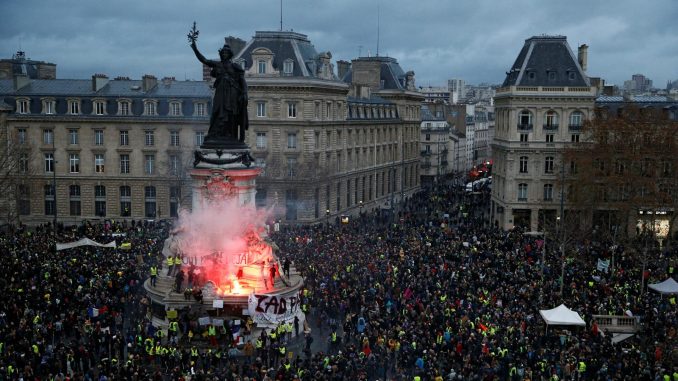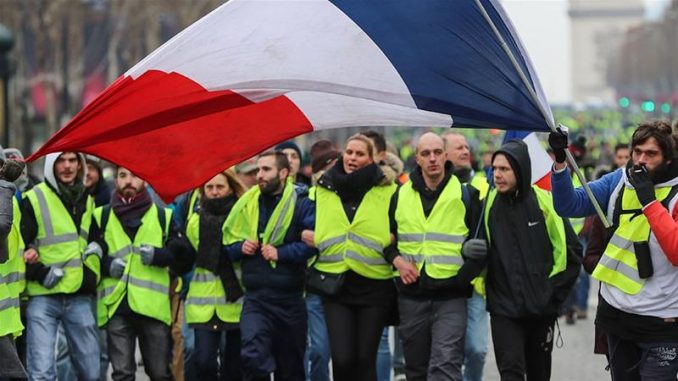by Seth Weiss
Richard Greeman, an American activist and Marxist writer residing in France, recently penned an article entitled “As Macron Prepares New Repressive Measures, Yellow Vests and Red Unions Strike Together.” In this piece, Greeman papers over real concerns about far-right and fascist influences on France’s Yellow Vest (gilets jaunes) protests, as well as numerous accounts of racism, xenophobia, anti-Semitism, misogyny, and homophobia within the movement. Greeman’s article has been promoted—without critical comment—by a variety of organizations of the North American left.
Is today’s left more concerned with championing populism than with fighting neo-fascism and advancing a genuinely liberatory politics?
Greeman gives much attention to a late January 2019 declaration, which he notes was agreed upon by delegates from seventy-five Yellow Vest assemblies that met in the town of Commercy in the Lorraine region, and which he describes as “democratic, egalitarian, anti-racist.” Greeman writes that “…in response to charges by Macron, the media, and any number of groups on the far Left, The Yellow Vests Declaration declares: ‘we are neither racist, nor sexist, nor homophobic, we are proud to come together with our differences [sic] to build a society of solidarity.’” This declaration, which Greeman notes is nonbinding and is included in an appendix to his article, also states that Macron has treated the Yellow Vests as a “hateful[,] fascistic[,] and xenophobic mob,” and counters that they are “quite the opposite.”
Source: Quartz
However, Greeman says nothing about the participation of some far-right and fascist forces in the Yellow Vest movement, including the support of Marine Le Pen and her neo-fascist National Front (recently renamed National Rally) party. The New York Times reports that France’s far-right has “…sent its own activists to join—critics say infiltrate—the protests, pushing its line that immigration is the central problem and that Mr. Macron sold out the country by agreeing to a nonbinding United Nations pact on migration recently reached in Marrakesh, Morocco.” The Times reports that the mayor of Hénin-Beaumont in Northern France, Steeve Briois, who is a leader in the National Front party, has offered a sanctuary for Yellow Vest protestors, providing them with a tent and license, in defiance of regional authorities, to march on a main road. In addition, Le Pen visited Hénin-Beaumont to show her support for protestors and to mark the opening of the town’s Christmas market with the mayor.[1]
Greeman employs what appear to be scare quotes (presumably to elicit doubt) in a description of Marine Le Pen as a fascist (“‘the fascist Le Pen’”). The National Front party was formed in 1972, under the leadership of her father, Jean-Marie Le Pen, a Holocaust denier and defender of France’s Vichy regime that collaborated with the Nazis. Since taking the reins in 2011, Marine Le Pen has advanced a so-called dédiabolisation (“de-demonization”) of the party, including the ousting of her father and the renaming of the party, after her defeat by Macron in France’s 2017 second-round presidential election. However, as CNN reports, “Le Pen shares her father’s core anti-immigration beliefs, which were central to her platform during the election.” In her campaign, she also “looked to slash legal immigration from 200,000 to 10,000 ‘entries’ per year in France, and wanted to see immigrants’ access to public services limited.”[2] She shares, as well, beliefs similar to those of her father about the Holocaust: Le Pen made headlines in 2017, maintaining that France was not responsible for the 1942 Vel d’Hiv roundup of more than 13,000 Jews, a third of whom were children, for deportation to Nazi concentration camps.[3]
Greeman is also silent about an early February meeting on the outskirts of Paris between Yellow Vest leaders and Italy’s Deputy Prime Minister Luigi Di Maio, prompting France to recall its ambassador to Rome. Evoking the specter of a new red-brown alliance, Di Maio led his “anti-establishment” and “left populist” Five Star Movement into a coalition government last summer with Italy’s far-right League party, led by Matteo Salvini. At the engagement that precipitated the diplomatic row, Di Maio, himself a proponent of anti-immigrant and euro-skeptic views, met with the controversial Yellow Vest leader Christophe Chalençon, described by the Guardian as a “figure with far-right connections.” The Guardian reports as well that Ingrid Levavasseur, one of the movements’ most prominent leaders and a candidate in France’s European Parliament elections in May, was also present and scheduled to have another meeting with officials of the Five Star Movement in Rome.[4]
A list of demands from the Yellow Vests, published in December, is also troubling. Bill Weinberg, an investigative journalist and activist, notes that: “The Yellow Vests’ official list of demands is basically populist—calling for tax relief, protection of wages, pensions, social security, public property, etc. But it equivocates dangerously on the critical issue of immigration. It calls for asylum-seekers to be ‘well treated.’ But an addendum of ‘unofficial’ (pending?) demands states ominously: ‘Prevent migratory flows that cannot be accommodated or integrated, given the profound civilizational crisis we are experiencing.’”[5]
Source: Al Jazeera
Greeman notes that France’s immigrant population, including Arabs, Berbers, Africans, and others, is not represented in the demographic makeup of the Yellow Vests—a movement that is predominately drawn from France’s white and rural lower-middle class and working poor. And Greeman adds that the Yellow Vests in Montpellier are, in part at his suggestion, trying to engage immigrant communities. But Greeman says nothing about the kind of anti-immigrant sentiment expressed in the aforementioned list of demands from the Yellow Vests, and he says nothing of numerous reports of racist and xenophobic incidents, including the assault on a black female motorist at a roadblock in the town of Cognac, in which Yellow Vest protestors reportedly shouted: “Go home, go back to your country” and “we don’t want to hear about the history of black people anymore.”[6]
Greeman is silent, as well, about the presence of anti-Semitism in the Yellow Vest movement. The issue made headlines in mid-February when Alain Finkielkraut, a prominent French intellectual of the right, was subjected to a verbal attack by a group of Yellow Vest protestors in Paris, who shouted slurs, like “dirty Zionist” and “go back to Tel Aviv,” before the police intervened.[7] France’s Interior Ministry recently reported a 74% spike in anti-Semitic incidents compared to 2017, and some contend that the Yellows Vest protests are fueling the fire.[8] Signs and graffiti exclaiming things like Macron is “the Jews’ bitch” and “Jewish trash” have been a feature of Yellow Vest protests and roundabouts.[9] In a poll recently conducted by Ifop (Institut français d’opinion publique), nearly half of the Yellow Vest supporters surveyed said that they believed in a worldwide “Zionist plot” (and in the “Great Replacement,” a conspiracy theory that presents immigration as purposefully designed “to replace Europe’s native populations.”)[10]
Some commentators have suggested a shift to the left in the Yellow Vest movement. And the joint strike of the Yellow Vests with France’s CGT (Confédération générale du travail) in early February, the focus of Greeman’s article, may be an indication of such a shift. However, Greeman, in what is perhaps the reflection of a spontaneist outlook, has cast aside critical perspective in favor of championing the outbreak of a mass movement. The problem is that populisms of the left and populisms of the right are not absolute opposites. Anti-Semitic conspiracy theory and Jew-hatred, for instance, are hardly the sole province of the far-right. Further, left populism can readily morph into a rightwing phenomenon, as is demonstrated by Italy’s Five Star Movement.
What is most troubling here is not Greeman’s article, but its reception: his piece is now being promoted online—without any critical commentary—by a variety of organizations and publications of the North American left, including CounterPunch, Monthly Review, New Politics, PM Press, Solidarity, Portside, ZNet, and Canada’s Socialist Project. (Note that these groups reflect a diverse set of left perspectives, including social democratic, Trotskyist, Stalinist, independent Marxist, and anarchist perspectives.)
This apparent willingness to overlook far-right and fascist influence on the Yellow Vest protests, along with racism, anti-Semitism, and xenophobia within the movement, is redolent of the response of many on the left to Trump and Trumpism: here, fighting neoliberalism and supporting left populist movements has often taken precedence over combating fascism and proto-fascism and developing genuinely anti-capitalist conceptions.[11]
Let’s be clear—this is a perilous gambit. Such left strategies of accommodation may facilitate the further spread of racism and authoritarianism, by leaving these ills unchecked, and thereby binding workers more firmly to the far-right. This threatens the possibility for solidarity across both racial lines and national borderlines, and it threatens the self-development and self-activity of the working class. What’s more, capital’s contradictions cannot be overcome by substituting populist economic measures for neoliberalism. And forces of reaction across the globe, which look to movements like that of France’s Yellow Vest protests for a home, stand ready to fill the breach as such left strategy fails.
[1] Andrew Higgins, December 16, 2018, “France’s Far Right Sees Gold in Yellow Vest Movement.”
[2] Amir Vera, March 11, 2018, “Marine Le Pen wants to rebrand the French nationalist party with a new name.”
[3] Geraldine Amiel, Bloomberg, April 9, 2017, “Le Pen Says France Not to Blame for Vel d’Hiv Roundup.”
[4] John Lichfield, February 9, 2017, “Just who are the gilets jaunes?”; Angela Giuffrida and Jon Henley, February 6, 2019, “France condemns Italy’s meeting with gilets jaunes leader.” Lichfield reports that Di Maio was invited by Chalençon—not by Levavasseur, who is quoted as describing both Di Maio and Chalençon as “sharks.”
[5] Counter Vortex, December 10, 2018, “The Yellow Vests and the carbon wars.”
[6] The Local France, November 19, 2018, “French fuel protests marred by death, injuries as well as homophobic and racist abuse.”
[7] BBC News, February 17, 2019, “Yellow-vest protests: Macron condemns anti-Semitic abuse.”
[8] The Associated Press, February 12, 2019, “Anti-Semitic Acts Registered by Police Rose 74% in France Last Year.”
[9] Alexander Hurst, The New Republic, January 7, 2019, “The Ugly, Illiberal, Anti-Semitic Heart of the Yellow Vest Movement.” Similarly, The New York Times reports that: “Muttering about the ‘Rothschild bank’ can frequently be heard at the edges of the demonstrations, mixed in with expressions of hatred toward the president.” (Macron was employed as a banker at Rothschild & Company; however, “Rothschild” is also an old anti-Semitic trope.) See Adam Nossiter, February 18, 2019, “Anti-Semitic Taunts by Yellow Vests Prompt French Soul-Searching.”
[10] Aljazeera, February 17, 2019, “Macron condemns anti-Semitic abuse at ‘yellow vest’ protest.”
[11] For further discussion, see Marxist-Humanist Initiative’s Resisting Trumpist Reaction (and Left Accommodation), especially Part III on “The Economic Mythology of the Left-Populist Alternative to Neoliberalism,” Part V on “Combating White Nationalism: Lessons from Marx,” and the last section of Part I, “Varieties of ‘Leftist’ Accommodation to Trumpism, and the Marxist-Humanist Alternative.” Part III also offers a critique of those on the left, like Slavoj Žižek and Tariq Ali, who advised French voters to abstain from going to the polls in the 2017 second-round presidential election on the grounds that there is no difference between Macron and Le Pen, no difference between neoliberalism and neo-fascism.




It seems to Me that any upsurge from a populist mass movement, which the yellow vest movement in France is a good example of such populism, will contain many diverse elements ranging from the far right to the far left. It is the duty of Marxists/Progressives to challenge such ideas and not either ignore them or even promote nationalist-populist solutions to the current global capitalist crisis. Keep reporting such important events MHI.